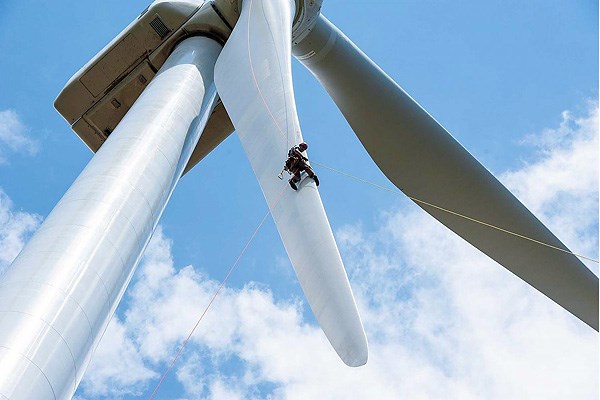$1.4M Federal Grant to Help Advance Work

05/01/2020
Contacts for media: Nancy Cicco, Nancy_Cicco@uml.edu and Christine Gillette, 978-758-4664 or Christine_Gillette@uml.edu
LOWELL, Mass. – A UMass Lowell researcher investigating how to identify damage in wind turbines before they fail has received $1.4 million to develop a solution.
Murat Inalpolat, assistant professor of mechanical engineering, has devised a way to assess the integrity of wind turbine blades by using sound. The new grant from the U.S. Department of Energy will support these efforts.
Wind power is projected to become a more than $170 billion industry over the next four years, according to a study by Global Market Insights Inc. There are nearly 60,000 wind turbines in the country and more than 341,000 around the world, according to figures from the U.S. Geological Survey and the Global Wind Energy Council.
Commercial wind turbine blades, which are made of fiberglass composite, can measure 200 feet or more in length and weigh many tons. Given their exposure to the elements, blades can split, crack or develop holes along their edges. Currently, this damage cannot be detected until after a blade has failed, according to Inalpolat.
“There is no other technology in today’s market that can monitor the condition and safety of turbine blades while they are operating,” said Inalpolat, a Merrimack, N.H., resident. “Our proposed system is low-cost, reliable, robust and it can be installed on both new and existing wind turbines.”
His invention uses wireless microphones mounted inside blades, wireless speakers inside the turbine’s cavity and a microphone placed near the structure to monitor the sounds emanating from inside of it. Any changes in audio frequencies would signal blade damage, according to Inalpolat.
In addition to the grant from the DOE, Inalpolat has received support for his research from the National Science Foundation and the Massachusetts Clean Energy Center, along with UMass Lowell’s WindSTAR research center and other areas of the university.
Conducting research alongside Inalpolat are UMass Lowell Ph.D. candidates Jaclyn Solimine from Haverhill and Caleb Traylor from Beeville, Texas. They are analyzing acoustic data they collect from full-size wind turbine blades being tested at the state Wind Technology Testing Center in Charlestown to determine which characteristics of sounds will be most useful in detecting damage, Solimine said.
UMass Lowell is a national research university located on a high-energy campus in the heart of a global community. The university offers its more than 18,000 students bachelor’s, master’s and doctoral degrees in business, education, engineering, fine arts, health, humanities, sciences and social sciences. UMass Lowell delivers high-quality educational programs, vigorous hands-on learning and personal attention from leading faculty and staff, all of which prepare graduates to be leaders in their communities and around the globe. www.uml.edu
